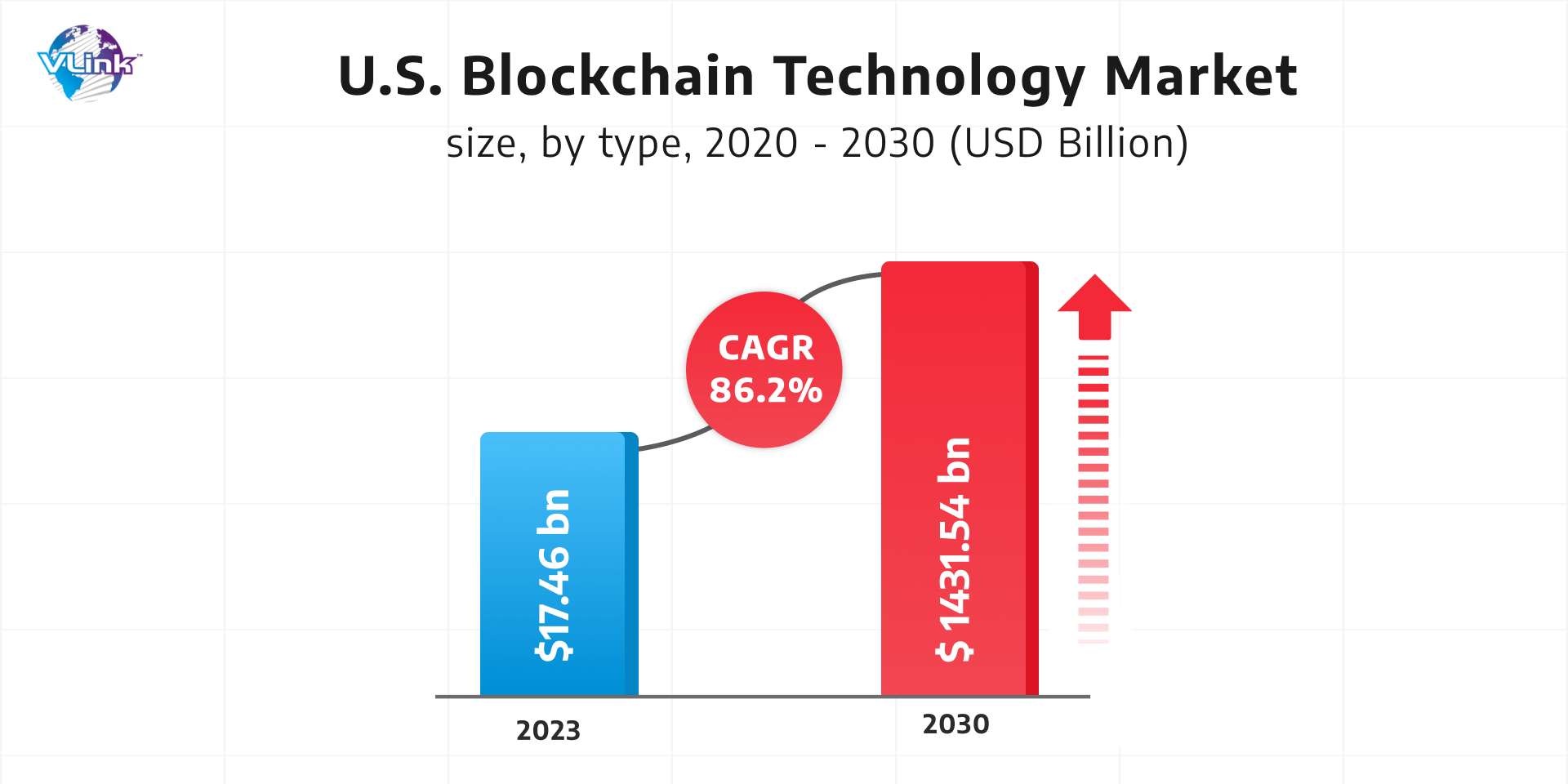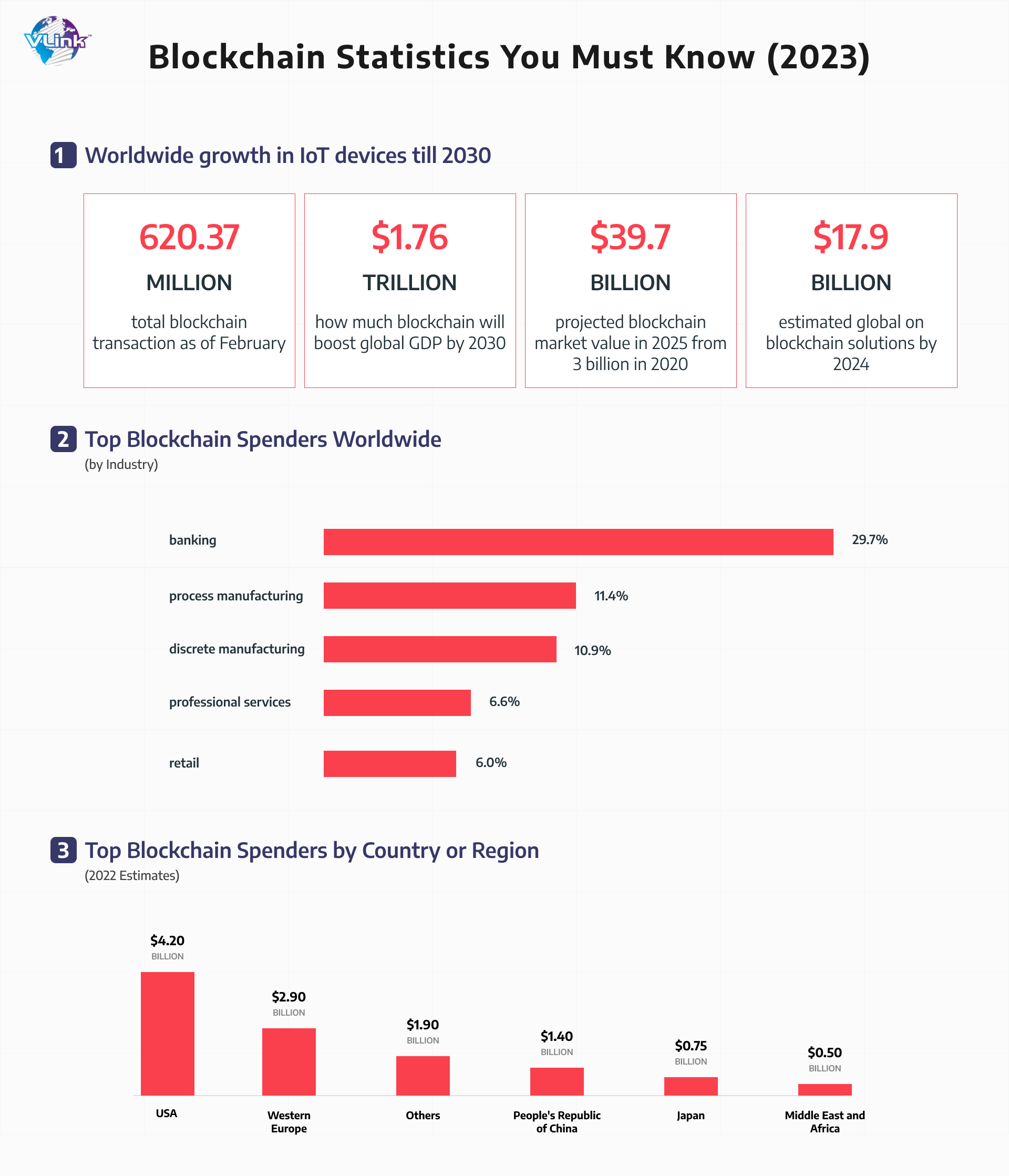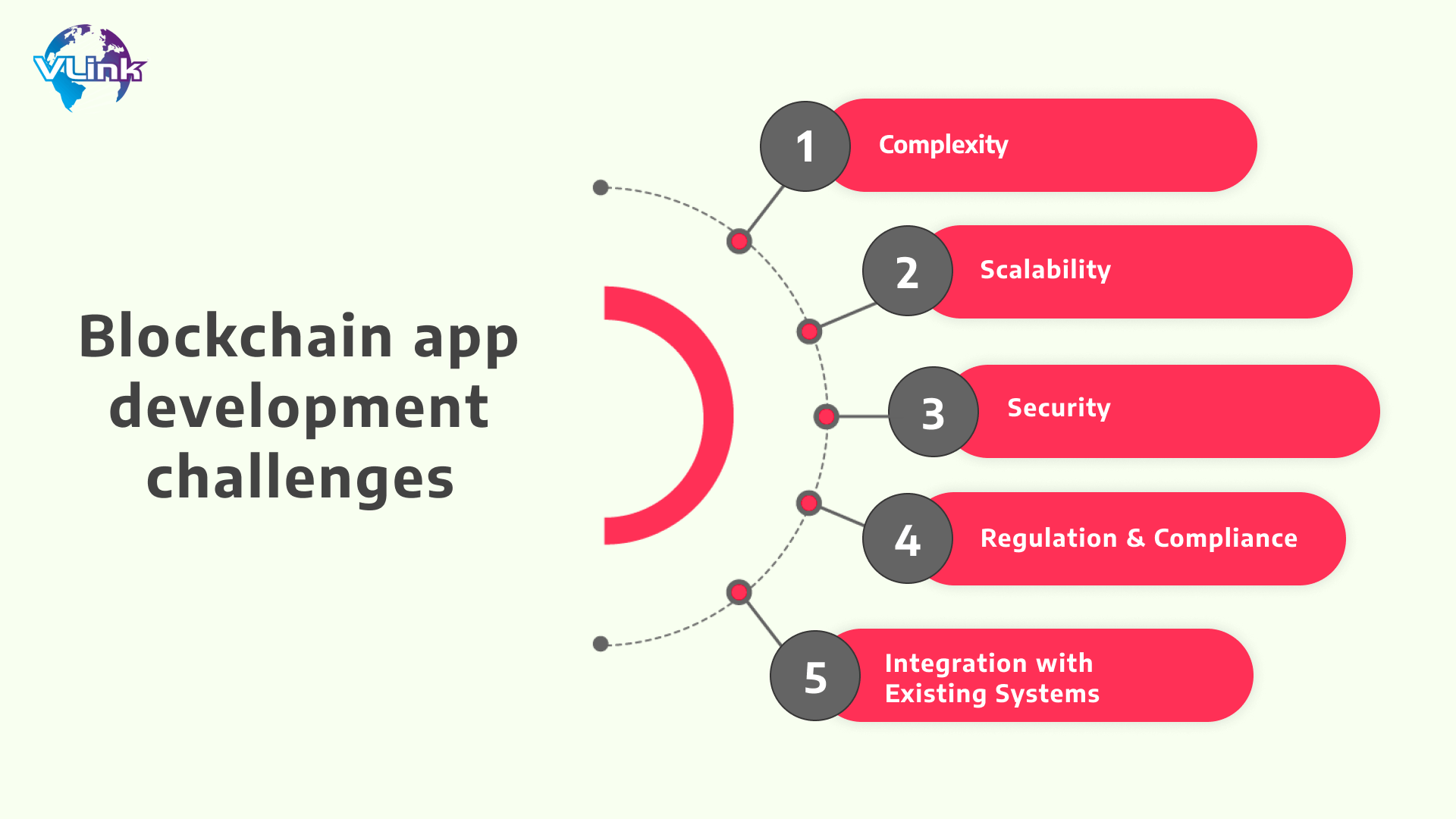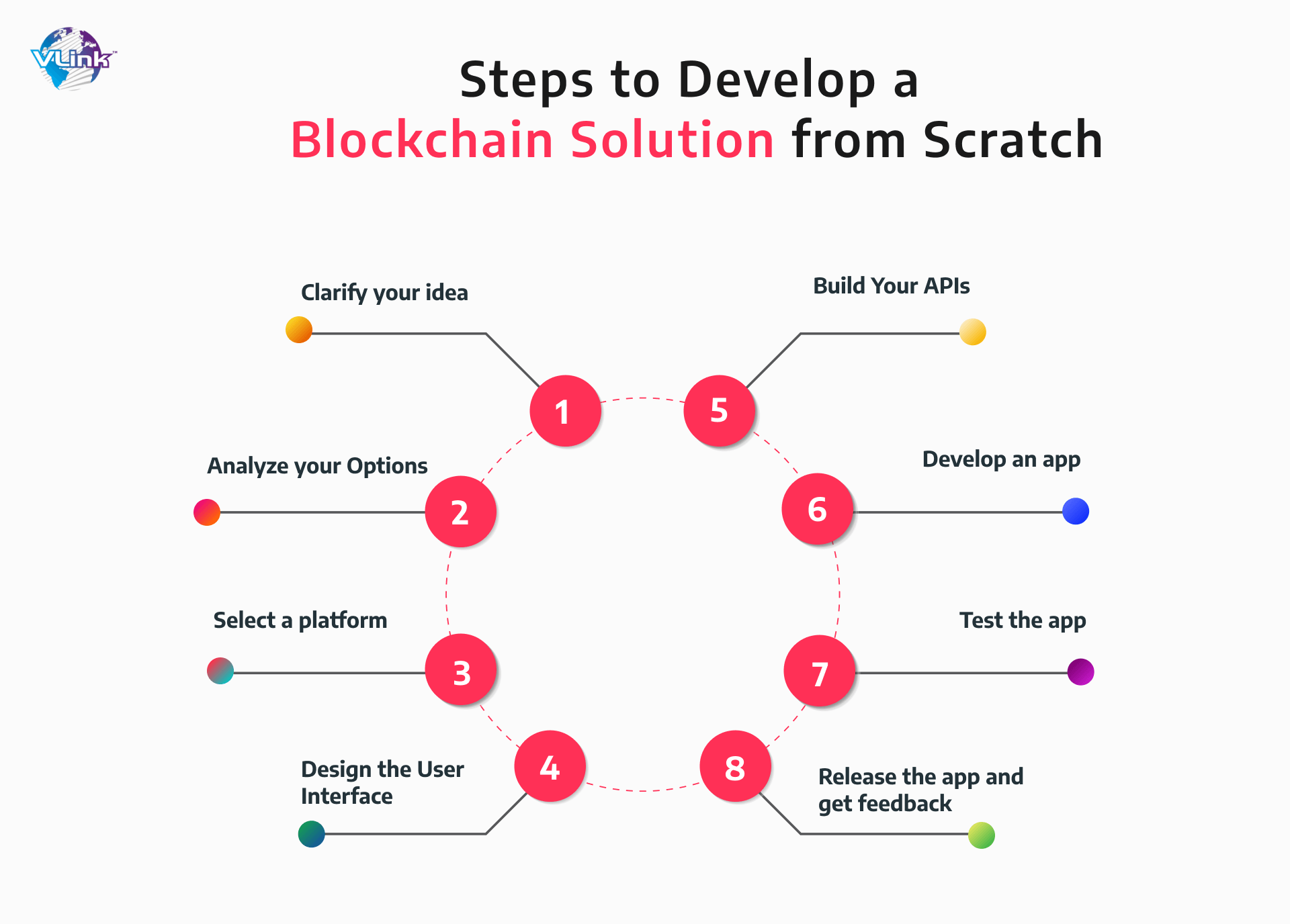Whether in finance or healthcare, blockchain has become a buzzword across diverse sectors in recent years. Even so, many businesses seek blockchain app development solutions to streamline operations, ensure security, and improve visibility.
According to a recent market report, the global blockchain market is forecast to reach $1,431.54 bn by 2030. And this technology will add around $1.76 trillion to the GDP by 2030.
The US blockchain technology market, by type, is shown in the below graph:

Undeniably, blockchain is a tech breakthrough megatrend with unmatchable potential in the future. But investing in blockchain software development can be risky without a clear understanding of how to successfully build and integrate such applications.
This blog will explore everything you need to know about blockchain app development, from challenges and steps to tech stacks and costs.
Let’s first start with its roots.
What exactly are blockchain apps or DApps?
DApps (decentralized applications) are blockchain apps without servers that act as an intermediary between users that exchange messages, money, or data. It opens lots of possibilities for many industries.
But, how does a blockchain app work?
A blockchain app uses distributed ledger technology to store and verify transactions. It ensures transparency, security, and decentralization through consensus algorithms and cryptographic techniques.
Market Overview of Blockchain Technology
The blockchain app market has grown significantly. According to Statista, the global DeFi market size was valued at $11.78 bn in 2021 and is expected to expand at a CAGR of 42.5% from 2022 to 2030.
Market statistics for blockchain technology in 2023 are shown below in the graphic illustration (Resource from finance online).

Blockchain technology aims to improve system efficiency, transparency, and trust in addition to its focus on cryptocurrency.
Benefits of Implementing Blockchain Solutions
Blockchain technology employs advanced cryptocurrency methods to ensure the security of data and transactions. Its decentralization property makes it highly resistant to hacking and manipulation.
That’s why blockchain is in high in-demand among industries dealing with sensitive data and identity management, such as finance, healthcare, government authorizations, etc.
Blockchain provides a transparent and unchangeable transaction ledger available to all participants. This transparency boosts trust among users, allowing for real-time auditing without any intermediaries.
It is especially useful in supply chain management, where stakeholders can trace the origin and movement of goods, ensuring authenticity and ethical practices.
Blockchain has the potential to streamline complex processes and eliminate intermediaries. Both Smart & self-executing contracts with predefined rules coded on the blockchain automate tasks and facilitate the transfer of assets.
This automation speeds up transactions, and minimizes errors, resulting in improved efficiency and cost savings.

Blockchain provides secure and decentralized data storage, making it difficult for cybercriminals to hack data and gain unauthorized access. The distributed ledger ensures data is replicated across multiple nodes, enhancing resilience and availability.
Blockchain's consensus mechanisms also ensure that all participants agree on data validity, improving data integrity and overall quality.
Blockchain has the potential to enable seamless collaboration and interoperability between different organizations and systems. Using standardized protocols and shared ledgers, blockchain can facilitate secure and efficient data exchange, enabling trusted interactions without costly integrations.
This benefit is particularly relevant in sectors like trade finance, where multiple parties with different systems and processes must work together.
Blockchain app development challenges
 Complexity
Complexity
Blockchain has complex concepts like distributed ledgers, unity algorithms, and smart contracts. Understanding them is crucial to developing an effective blockchain application, but it is a very challenging task.
So, hire a blockchain developer who has a solid grasp of these concepts.
Scalability
Scalability is a significant challenge in blockchain app development. With the increasing number of blockchain users and transactions, maintaining performance and efficiency is becoming challenging. That’s why, many blockchain apps are losing their active users.
Developing a blockchain app that can handle a growing user base and transaction volume should be a top priority.
Security
Security is paramount in blockchain applications dealing with sensitive data and financial transactions. Developers must implement robust security measures to protect against smart contract hacking, data breaches, and vulnerabilities. Additionally, ensuring the security of private keys and user wallets is crucial.
Regulation and Compliance
Blockchain applications may need to comply with various legal and regulatory frameworks, depending on their jurisdiction. Staying compliant with evolving regulations, such as data protection and anti-money laundering laws, can challenge developers.
Integration with Existing Systems
Integrating blockchain applications with legacy systems can be complex, especially if the systems have different data formats or protocols. So, you will need to implement integration solutions to enable seamless communication, and transactions between blockchain and non-blockchain systems.
So, these are a few common challenges many developers or businesses face when building blockchain apps. Make sure you have technical expertise and an idea about user requirements, business objectives, and deep understanding.
But regardless of your requirements, you’ll need to follow some key steps for developing blockchain apps from scratch.
Steps to Develop a Blockchain Solution from Scratch

When building your blockchain app, it’s very important to clarify your idea regarding your product.
You should identify if you need a blockchain and what you want. Then, consider the issues you want to resolve with your DApp and implement your idea.
Technically, you can develop your DApp in four different ways:
- Go with the open blockchain for your app. For instance, you can implement Ethereum or Bitcoin into your mobile app development solution.
- Create a private network with the help of blockchain software.
- Integrate BaaS (Blockchain as a Service) provider’s cloud service into your app. Amazon, Azure, and Microsoft all offer BaaS products.
- Build your blockchain network as per your preferred platform.
Also Read: key benefits of the Microsoft Azure cloud platform before investing in.
Here are a few platforms you can choose for your blockchain project:
Ethereum
The most popular platform that allows you to build a blockchain app and create your ecosystem is a language called Solidity. You can also use Ethereum to develop smart contract solutions.
Hyperledger
If you want to exchange data within your own company, Hyperledger is a corporate tool. You will need a team of Go, JS & Java developers to build a blockchain app solution on this platform.
R3 Corda
This platform focuses on commerce, healthcare, supply chains, and financial services industries. In addition, you can easily integrate it with legacy systems.
Also Learn: How to build custom finance software for your business?
Ripple
If you want to create a financial tool, Ripple is a great platform. It lets you easily send money anywhere and integrates with banks and payment providers.
Selecting a platform for your blockchain app will influence your development team’s skill set.
After planning and selecting the right choice regarding the entire blockchain app, you can begin designing the UI for every software element. Visual design affects the app’s overall look, and tech designs impact its architecture.
While many platforms consist of readymade APIs, you may need to develop application programming interfaces, depending on your needs. Here are a few reasons;
- Generation of key pairs and addresses
- Performance of audit-related functions
- Data authentication
- Data storage and retrieval
- Smart-asset lifecycle management
- Smart contracts
Consider your application's features, workflow, potential for user involvement, and internal services. Create a product by coordinating all of your ideas with the development team.
You can verify the application's accuracy in all respects and prevent mistakes from occurring during future operations with effective testing and QA services.
Launch the program and get the first users' feedback. Think of ways to make your blockchain app better.
Tech Stacks and Programming Languages Used in Blockchain App Development
Blockchain app development comprises various tech stacks, frameworks, and programming languages. The specific tech stack and programming languages used can vary depending on the development team's preferences.
However, here are some commonly used technologies and programming languages in blockchain app development:
Blockchain Platforms:
- Ethereum
- Hyperledger Fabric
- Corda
Smart Contract Languages:
- Solidity: A programming language for writing smart contracts on the Ethereum platform.
- Vyper: A smart contract language for Ethereum that focuses on security and simplicity.
- Chaincode (Go): A term for smart contracts on Hyperledger Fabric, typically written in Go (Golang).
Web Development:
- HTML/CSS
- JavaScript
- React, Angular, or Vue.js
Backend Development:
- Node.js
- Python
- Java
Database Technologies:
- MongoDB
- PostgreSQL
Other Technologies:
- Web3.js
- Truffle: Truffle is a development framework and testing suite for Ethereum-based applications.
- IPFS (InterPlanetary File System): A protocol and peer-to-peer (P2P) network for storing and sharing data in a distributed manner.
Are you a lender who wants to make your business grow in today's competitive digital marketplace? You need to know how to create a successful P2P lending app. Higher ROI, portfolio diversification, and risk assessments are some of the benefits you can get from investing in this software.
How Much Does It Cost to Build a Blockchain App?
The rough estimation of blockchain app development costs varies from $40,000 to $300,000. Certain factors affect the overall development costs of the app’s niche, including UI/UX design, development, and testing.
Read About: why UI/UX is important in mobile app development.
The overall app’s complexity is crucial to determining the blockchain app's cost and time frame. Here is an estimated cost and time frame to build a blockchain app per the various complexity levels.
Blockchain App Type as Complexity | Estimated Costs | Time Frame |
Simple App | $40,000 to $60,000 | 3 to 6 months |
Moderately Complex App | $60,000 to $150,000 | 6 to 8 months |
Highly Complex App | $150,000 to $300,000 | 9+ months |
To determine the exact cost of blockchain implementation, you should categorize the blockchain solution for your business. Let's look at the percentage of the price allotted to several milestones of a successful project.
Project Milestones | Cost (%) Associated with it |
Initial Consult | 5% |
UI/UX Design | 10% |
Development | 45% |
Quality Assurance | 25% |
Deployment and Maintenance | 15% |
Here are several factors that can affect the cost of blockchain app development:
- Agency size
- Industry-wise blockchain app development
- Complexity level
- App category
- Blockchain app services
Here are blockchain app development costs, by company size and exerts:
- Large app development companies, with a team size of 3000+ experts, – $450,000 to $1,500,000
- Mid app development companies, with a team size of 1000+ experts, - $40,000–$300,000.
- Freelancers or small companies, with a team size of 10 to 50 experts – $2,000 to $ 25,000.
The blockchain app development cost difference as per various industries:
- Healthcare: $55k-200k+
- On-Demand: $40k-1000k
- Social Media: $45k-100k+
- Public Sector: $70k-100k+
- Finance Sector: $50k-300k+
Also Learn: Reasons why the financial sector should embrace IT.
A breakdown of estimated blockchain app development costs and time frames as per different types:
Types of blockchain app development | Estimated costs | Time frame |
NFT Marketplace | $55,000 to $125,000 | 8 to 9 months |
DApp | $35,000 to $150,000 | 4 to 8 months |
Decentralized Autonomous Organization (DAO) | $10,000 to $30,000 | 1 to 2 weeks |
Cryptocurrency Wallet | $125,000 to $200,000 | 6 to 9 months |
Cryptocurrency Exchange | $135,000 to $190,000 | 4 to 5 months |
If you want to build a blockchain app at an affordable rate, connect with a dedicated development team like VLink!
How can VLink help in Blockchain app development?
As a leading blockchain development company, VLink specializes in building and deploying advanced blockchain solutions. Our experienced developers provide comprehensive solutions to help our clients gain a competitive edge in the blockchain ecosystem.
We have many years of experience in designing and developing customized blockchain solutions using Hyperledger, EVM, Solidity, Cosmos, or Substrate.
From developing business logic to operating blockchain nodes, we understand how to create decentralized platforms for NFTs, bridges, DEX, the metaverse, tokens, and dApps.
Wrapping Up!
Hopefully, you have now understood the process involved in building a blockchain app. DApps are in demand because the technology has many advantages, such as transparency, security, and cost reduction.
Do you have any queries related to the blockchain app's commercial use? You can contact VLink experts for advice. We will be happy to help your idea come true.
Frequently Asked Questions
Blockchain development should be implemented when there is a need for decentralized, secure, and transparent data management. It is particularly useful in finance, supply chain management, healthcare, and voting systems where trust, immutability, and real-time tracking of transactions or information are critical requirements.
Blockchain application development has numerous use cases across industries.
Firstly, supply chain management benefits from transparency, traceability, and fraud reduction.
Secondly, financial services leverage secure transactions, eliminating intermediaries and facilitating cross-border payments.
Thirdly, the healthcare industry improve data sharing and medical record management.
Last but not least, voting systems enhance transparency and security. Lastly, blockchain protects intellectual property rights.
To make money through blockchain applications, you can consider various options like creating and selling blockchain-based products or services, investing in cryptocurrencies or blockchain startups, providing consulting or development services, or participating in blockchain-based reward programs or decentralized finance (DeFi) platforms.







